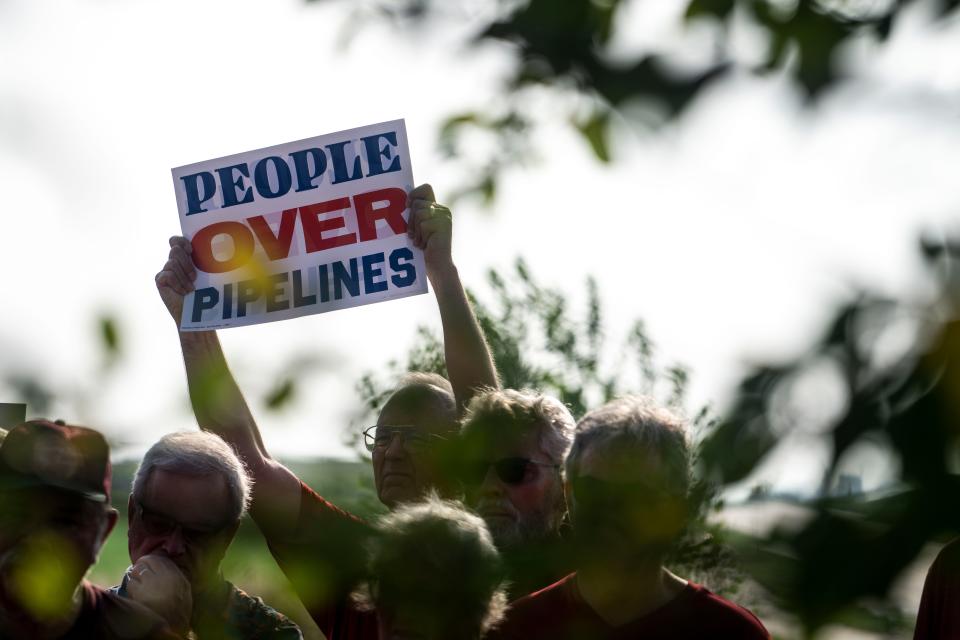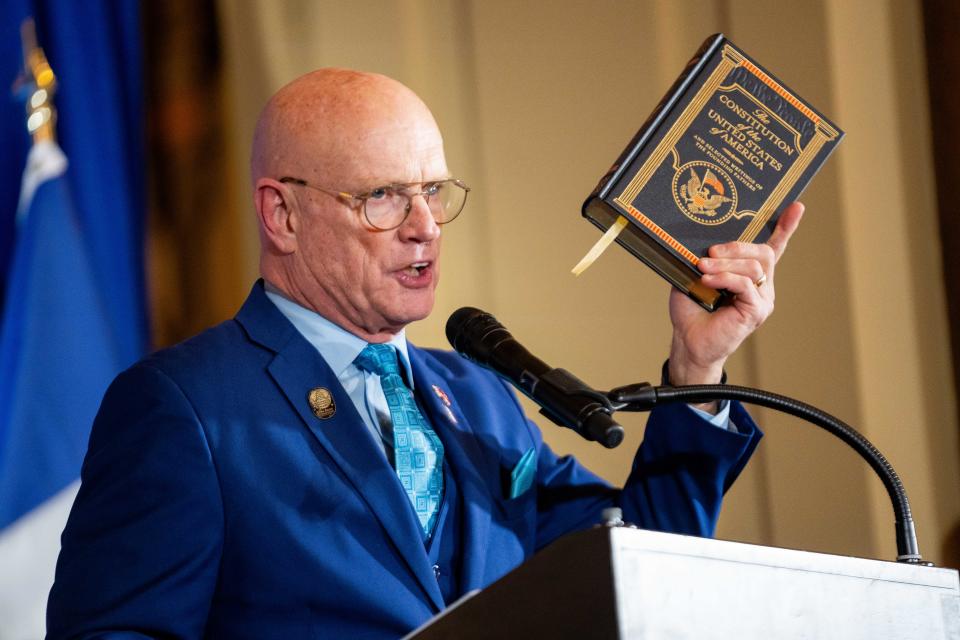Iowa bill would let lawmakers halt eminent domain use by carbon capture pipelines
Iowa House lawmakers are deliberating on a bill that would give the Legislature the power to intervene to halt eminent domain proceedings in the state — a response to ongoing disputes around the construction of carbon capture pipelines.
A three-member House subcommittee voted to advance House Study Bill 608 on Wednesday.
At any time during the eminent domain process, the bill would allow 21 members of the Iowa House or 11 Iowa senators to file a petition to halt the process, stopping all associated hearings, trials or other proceedings.
It would take a vote of at least 60% of the House and 60% of the Senate to resume the eminent domain proceeding. The eminent domain process could also continue if 60% of each chamber sign a letter attesting that they believe the use of eminent domain is constitutional in that case.
"I think it’s important that elected people, not appointed people, make this decision," said Rep. Charley Thomson, R-Charles City. "Because if we get it wrong we answer to the voters and they can throw us out. Right now the decision making is being done by unelected people."
The bill would also allow a company seeking eminent domain or a landowner who would be subjected to eminent domain to ask a court to review whether eminent domain is proper.
Several landowners who would be affected by the pipeline proposed by Summit Carbon Solutions spoke Wednesday morning at the House subcommittee meeting, complaining about the process followed by the Iowa Utilities Board in holding a hearing last fall on the company's request for eminent domain.

"We need oversight," said Jess Mazour with the Iowa Sierra Club. "We need somebody to be able to step in and pause the proceeding. And that’s what this bill does."
Summit is proposing a $5.5 billion pipeline that would capture carbon dioxide emissions from ethanol plants in five states, liquefy it under pressure and transport it by a pipeline to North Dakota to be sequestered underground.
Iowa regulators are considering Summit’s request for a permit to build the hazardous liquid pipeline after holding a hearing in Fort Dodge for eight weeks. Along with a permit, Summit seeks eminent domain powers, which would force unwilling landowners to sell them access to their property for the pipeline.
More: With Navigator out, POET proposes to connect 12 Iowa ethanol plants to Summit pipeline
Summit has pushed back its timeline for the pipeline, citing regulatory difficulties in several states, saying it doesn't expect it to become operational until 2026, two years later than initially projected.
Thomson said he believes the pipelines' proponents have manipulated the current process of seeking eminent domain through the Iowa Utilities Board in their favor.
"This is not about eliminating eminent domain," Thomson said. "This is about putting some due process safeguards on it and making sure that the due process that is in place is responsive to the people."
Sabrina Zenor, a spokesperson for Summit, said three-quarters of the landowners along the pipeline's route have reached agreements with the company.
"Summit Carbon Solutions will ensure the long-term viability of the ethanol industry, and boost land values and commodity prices," Zenor said in a statement.
The issue of carbon capture pipelines have split Republicans, who control the Iowa House and Senate. Ethanol producers and the pipelines' supporters have said capturing and sequestering carbon emissions is a way for the industry to remain viable amid efforts to limit global warming. Opponents have criticized the use of eminent domain for the projects and raised concerns about the pipelines' safety.
House lawmakers passed a bill last year that would have required companies seeking to build carbon capture pipelines to reach voluntary agreements to buy 90% of the land on their proposed route before they could ask the state for the ability to use eminent domain. The Senate did not give the bill a hearing.

Rep. Steven Holt, R-Denison, who led the passage of that bill in the House, said he was "extremely disappointed" the bill did not move forward in the Senate.
"I have no objection to this pipeline," Holt said. "I have objection to the use of eminent domain for this pipeline. I have objection to these companies using the heavy hand of government to try to seize the private property of landowners in my district for what is clearly a private economic development project that does not meet the constitutional bar requirement for public use."
Holt, who chairs the House Judiciary Committee, said he doesn't know how this year's bill will fare in the Iowa Senate.
"I have no idea if anything’s changed over there," he said. "I can only control what I can control so we’re going to do our best to do the right thing over here and let the chips fall where they may."
Another company, Navigator CO2 Ventures, announced in October that it was dropping its own plans to build a carbon pipeline.
Stephen Gruber-Miller covers the Iowa Statehouse and politics for the Register. He can be reached by email at sgrubermil@registermedia.com or by phone at 515-284-8169. Follow him on Twitter at @sgrubermiller.
This article originally appeared on Des Moines Register: Iowa House bill would let lawmakers object to eminent domain use

